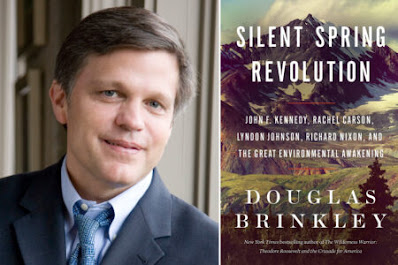The historian, whose latest book is ''Silent Spring Revolution,'' has a lot of Duke Ellington books on his shelf. I learned how to play '' in a Sentimental Mood " on piano as a teenager and it remains my standard.
.- Describe your ideal reading experience [when, where, what how].
I like coffee, music and food when reading, so I tend to become a fixture at independent coffee shops and cafes.
My current haunt is 24 Diner on Lamar Boulevard in Austin - partly because it's located next to Waterloo Records and always has good music playing, heavy on Willie Nelson, Louis Armstrong, Grateful Dead, Arturo O'Farrill, the Smiths, Mavis Staples and Freddy Fender. The louder the music is playing, the better my mood and concentration.
.- Your new book is about ''Silent Spring'' and Rachel Carson's impact on public policy and the environmental movement. What led you to Carson's work?
If you teach history at, as I do at Rice University, you can't help grappling with Rachel Carson. But getting to write a book about her is a dream come true. Everything about her career is exemplary, but when she published ''Silent Spring'' in 1962, it was like Zeus hurling a lightning bolt into America's political landscape.
This wasn't Theodore Roosevelt saving Muir Woods by presidential proclamation; this was someone telling parents that DDT and the other chemicals saturating post-World War II America were literally making their children sick - not to mention wiping out populations of eagles, hawks and fish.
Bill McKibben perfectly describes Carson as the woman who knocked ''the shine off modernity.'' But her books helped jump-start a more sustainable way of living.
.- What other writers, today or in the past, have had a comparable effect on policy through their books?
Thomas Paine's ''Common Sense'' was seismic during the American Revolution, '' The Journal's Zebulon Montgomery Pike'' helped fuel Western expansion, and Harriet Beecher Stowe's ''Uncle Tom's Cabin'' furthered the cause of abolishing slavery.
Upton Sinclair's ''The Jungle'' convinced President Roosevelt to pass the Pure Food and Drugs Act of 1906. Ralph Nader's 1965 ''Unsafe at Any Speed'' wasn't quite as impactful as ''Silent Spring,'' but it spurred creation of the U.S. Department of Transportation and the National Highway Traffic Safety Administration. There are others.
.- If you could require the president to read one book, what would it be?
''The Undocumented Americans,'' by Carla Cornejo Villavicencio. Too often Dreamers [DACA] have been dehumanized or been treated as burdensome statistics, but Villavicencio's masterpiece tells their story with visceral emotion and survivalist logic.
.- Which subjects do you wish more authors would write about?
We need more environmental manifestoes like Cynthia Barnett's '' Blue Revolution '' and Seth M Siegel's '' Troubled Water, '' about how sewage, industrial debris and agricultural runoff have contaminated our water systems, even as population growth, climate change and drought are stretching our water supply thin.
In the same vein, Mark Kurlansky's 2020 book ''Salmon'' shows how the fish is a living barometer of Earth's health. I believe every river and lake in America should be swimmable, but the situation is more like Kurt Vonnegut once said about Lake Erie - that it's dying from ''excrement and Clorox bottles.''
The World Students Society thanks The New York Times.

.png)


0 comments:
Post a Comment
Grace A Comment!